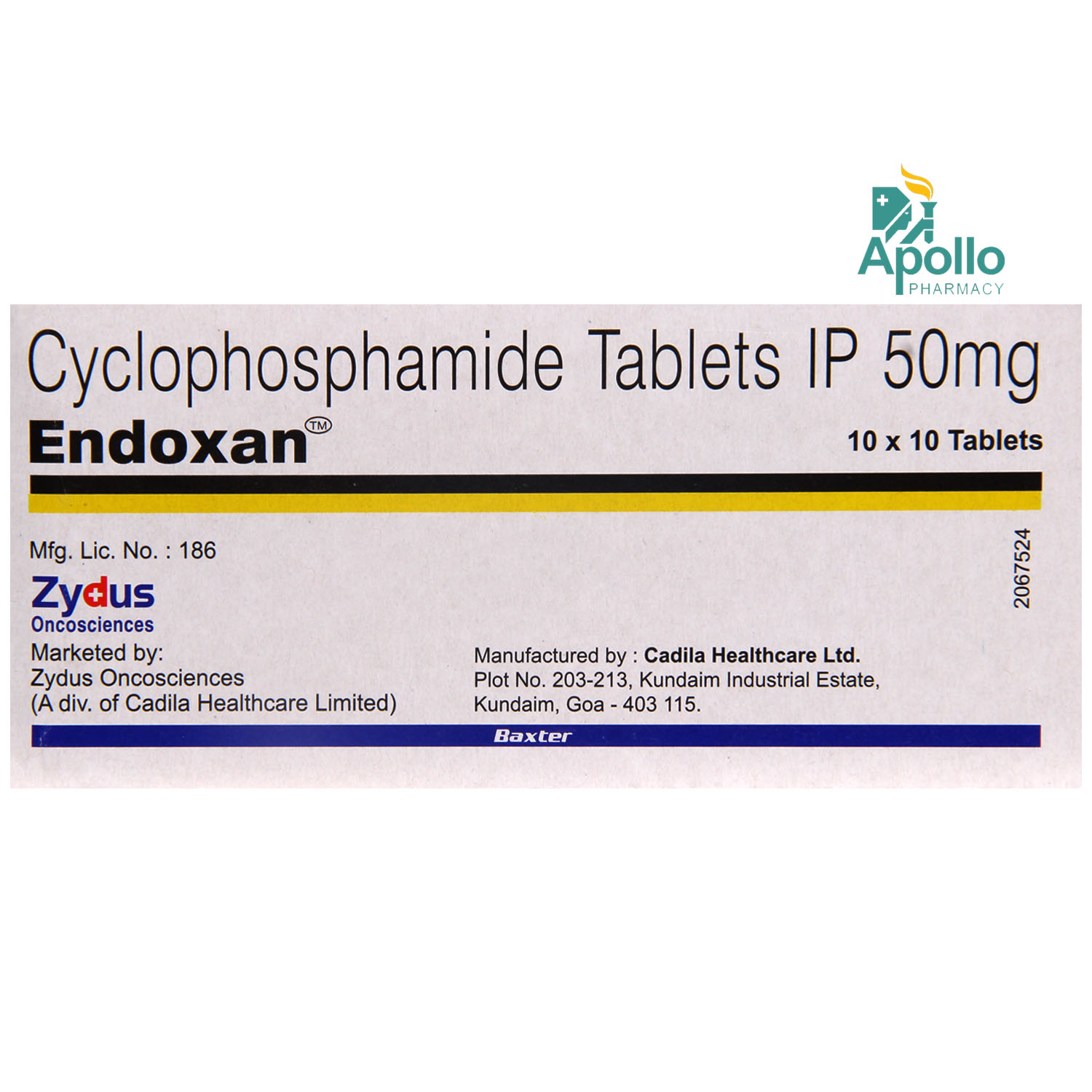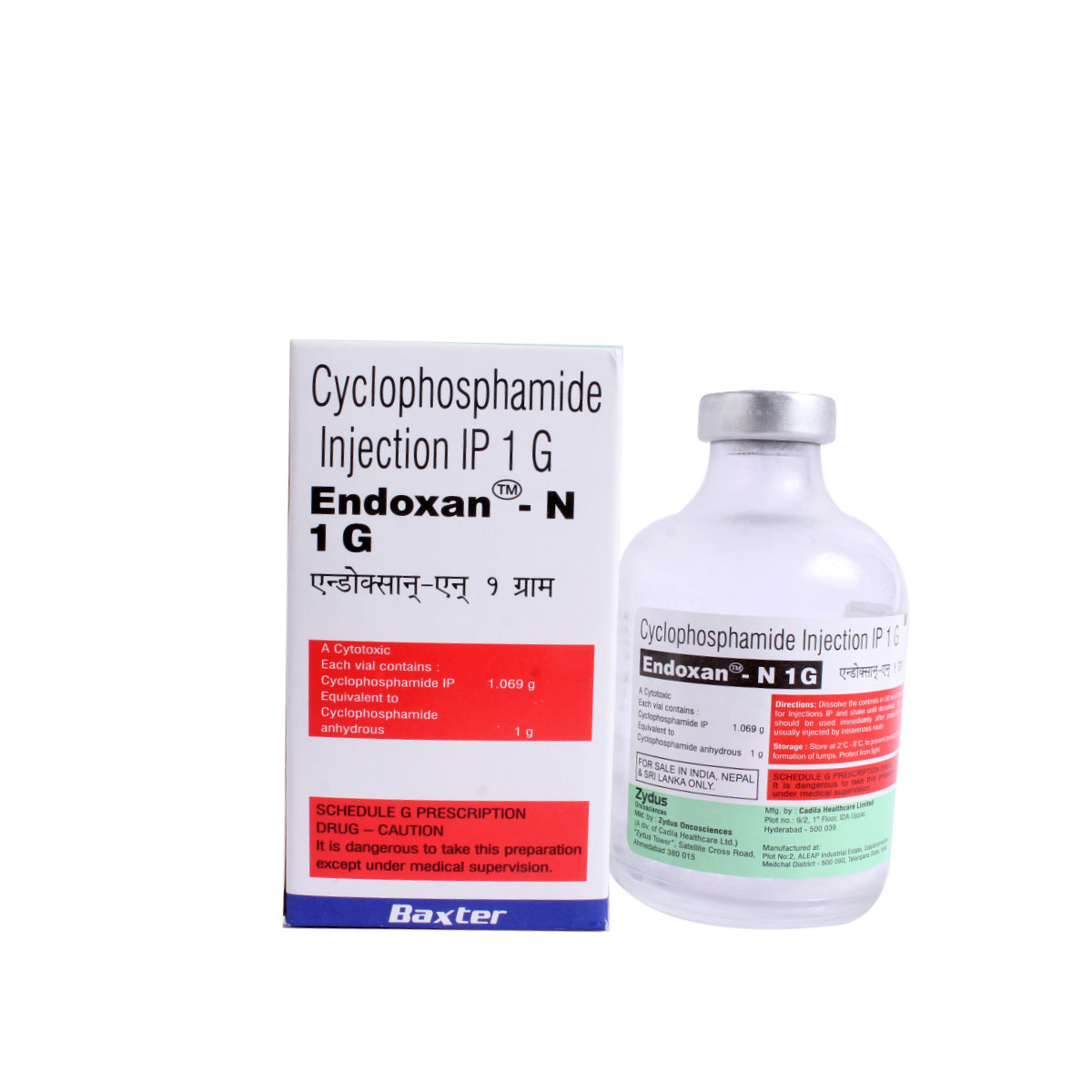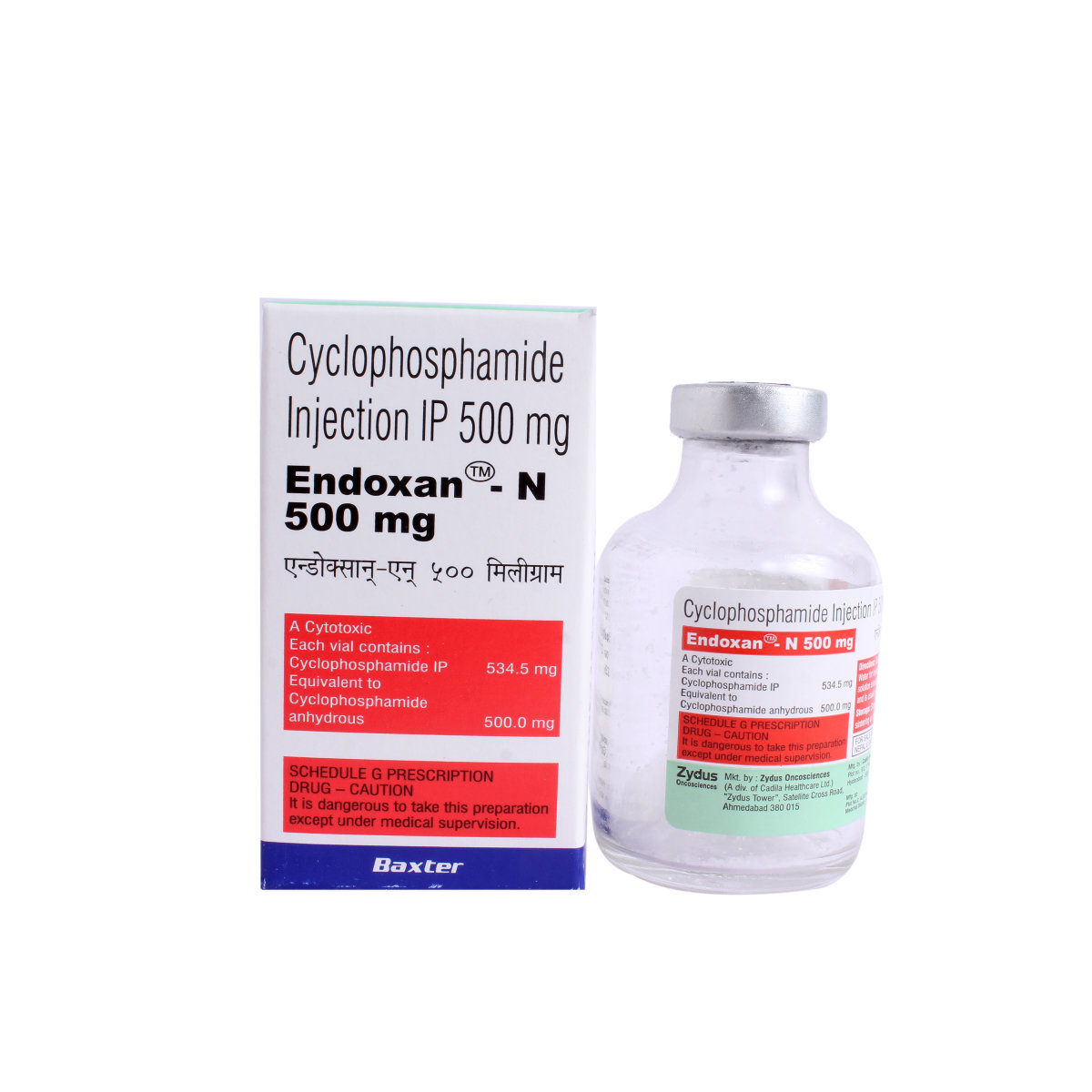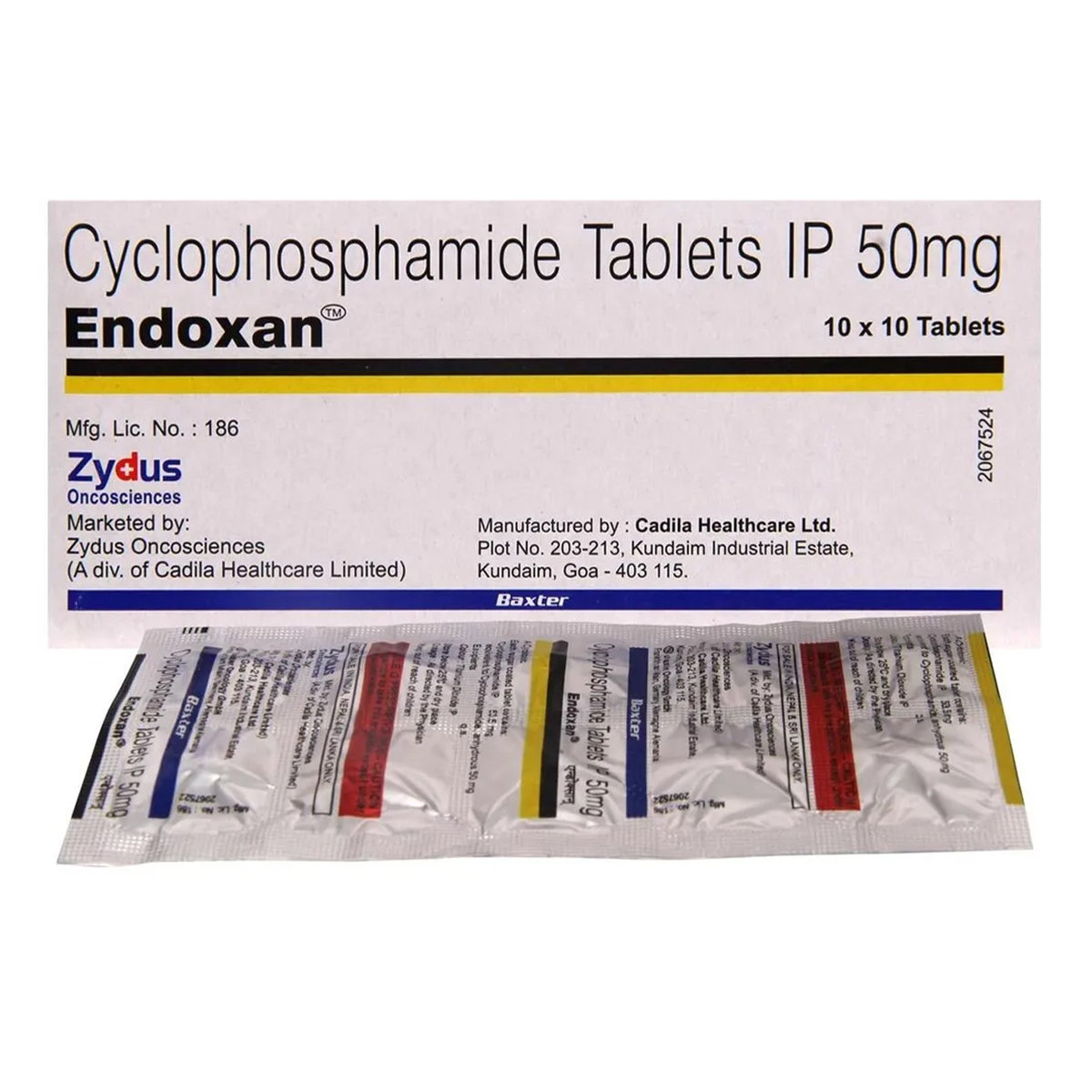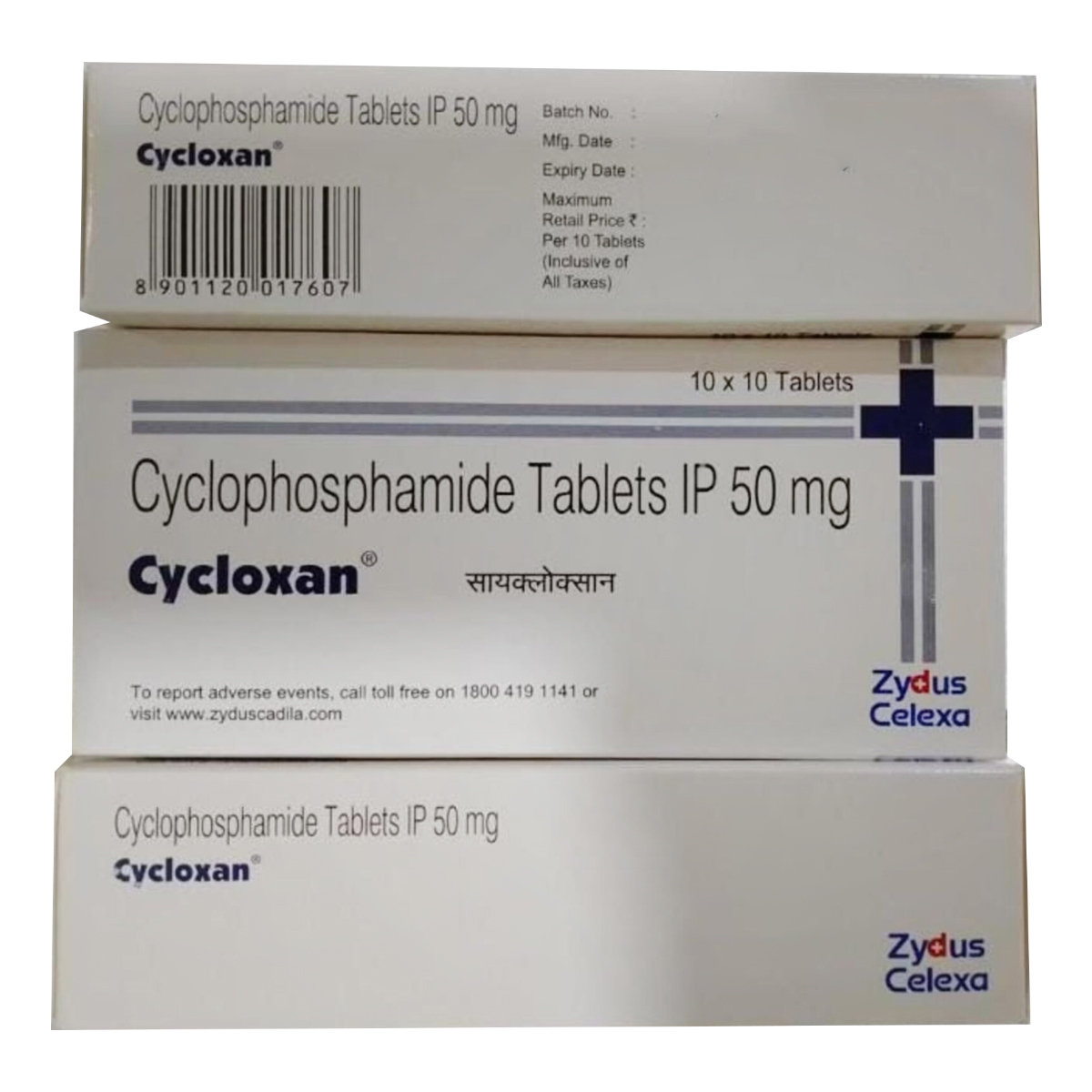Cyclophosphamide
About Cyclophosphamide
Cyclophosphamide belongs to the group of anti-cancer medicines used to treat malignant diseases such as lymphoma (Hodgkin’s disease, mixed-cell type lymphoma, lymphocytic lymphoma, histiocytic lymphoma, multiple myeloma, Burkitt’s lymphoma, mycosis fungoide), leukaemia, nerve tissue cancer, eye cancer, ovarian cancer, soft tissue cancer, bone cancer, and breast cancer. Additionally, Cyclophosphamide is used to treat minimal change nephrotic syndrome (kidney disease) in paediatric patients.
Cyclophosphamide contains ‘Cyclophosphamide’, an alkylating agent that stops the growth and multiplication of cancer cells by damaging their genetic material. Thereby, Cyclophosphamide helps to treat cancer by killing the cancer cells.
You are advised to take Cyclophosphamide for as long as your doctor has prescribed it for you, depending on your medical condition. In some cases, you may experience certain common side effects, such as fever, nausea, vomiting, diarrhoea, hair loss, low blood cell count, and abdominal pain. Do not be reluctant to talk with your doctor if you experience any of these side effects persistently.
Do not take Cyclophosphamide if you are allergic to any of its components; or if you have bladder obstruction or other urination problems. Avoid taking Cyclophosphamide if you are pregnant or breastfeeding. Cyclophosphamide may cause dizziness, so drive only if you are alert. Cyclophosphamide should be given to children only if prescribed by the doctor. Inform your doctor about your health condition and medications to rule out any side effects/interactions.
Uses of Cyclophosphamide
Medicinal Benefits
Cyclophosphamide belongs to the group of anti-cancer medicines used to treat malignant diseases such as Hodgkin’s disease, mixed-cell type lymphoma, lymphocytic lymphoma, histiocytic lymphoma, multiple myeloma(cancer of plasma cells), Burkitt’s lymphoma, leukaemia (blood cancer), neuroblastoma (nerve tissue cancer), retinoblastoma (eye cancer), adenocarcinoma of the ovary (ovarian cancer), mycosis fungoides (T-cell lymphoma), rhabdomyosarcoma (soft tissue cancer), osteosarcoma (bone cancer), and breast carcinoma. Additionally, Cyclophosphamide is used to treat minimal change nephrotic syndrome (kidney disease) in pediatric patients. Cyclophosphamide is an alkylating agent that stops the growth and multiplication of cancer cells by damaging their genetic material. Thereby, Cyclophosphamide helps to treat cancer by killing the cancer cells.
Directions for Use
Storage
Side Effects of Cyclophosphamide
- Fever
- Nausea
- Vomiting
- Diarrhoea
- Hair loss
- Low blood cell count
- Abdominal pain
Drug Warnings
Do not take Cyclophosphamide if you are allergic to any of its contents; or have urinary flow obstruction, bone marrow suppression, or infections. Talk to your doctor if you have myelosuppression, immunosuppression, infections, diabetes, heart, lung, liver, or kidney problems. Inform your doctor if you are receiving any radiotherapy or chemotherapy. Avoid taking Cyclophosphamide if you are pregnant or breastfeeding. Cyclophosphamide may cause dizziness, so drive only if you are alert. Inform your doctor about your health condition and medications to rule out any side effects/interactions.
Drug Interactions
Drug-Drug Interactions: Cyclophosphamide may have interaction with anti-cancer (doxorubicin, paclitaxel), anti-emetic (aprepitant, ondansetron), monoclonal antibody (natalizumab), anti-HIV (zidovudine), thiazide diuretics, and ACE inhibitors.
Drug-Food Interactions: No interactions found/established.
Drug-Disease Interactions: Inform your doctor if you have myelosuppression (decreased activity of bone marrow), urinary tract obstruction, or lung, heart, kidney, or liver impairment.
Drug-Drug Interactions Checker List:
Safety Advice

Alcohol
consult your doctorIt is not known if alcohol affects Cyclophosphamide. Please consult your doctor.

Pregnancy
unsafeCyclophosphamide belongs to pregnancy category D. Cyclophosphamide should not be taken during pregnancy as it might cause fetal harm. Inform your doctor if you are pregnant, think you are pregnant or planning for pregnant.

Breast Feeding
unsafeCyclophosphamide passes into breastmilk. Avoid breastfeeding while taking Cyclophosphamide.

Driving
cautionCyclophosphamide may cause dizziness. Drive or operate heavy machinery only if you are alert.

Liver
cautionDose adjustment may be needed. Please consult your doctor if you have a liver impairment or any concerns regarding this.

Kidney
cautionDose adjustment may be needed. Cyclophosphamide should be used with caution in patients with renal impairment. Please consult your doctor if you have kidney impairment or any concerns regarding this.

Children
cautionCyclophosphamide should be given to children only if prescribed by a doctor.
Habit Forming
Diet & Lifestyle Advise
- Consume a healthy diet and exercise regularly to maintain proper weight.
- Avoid smoking and alcohol consumption.
- Include leafy vegetables, citrus fruits, fatty fish, berries, yoghurt, apples, peaches, cauliflower, cabbage, broccoli, beans, herbs, and spices.
- Avoid fast, fried, processed meats, refined carbs, and added sugar.
- Get optimal sleep; rest well.
- Stay protected from the sun. Avoid tanning beds and cover up with clothing, sunscreen, and sunglasses.
Special Advise
- Monitoring of complete blood count while taking Cyclophosphamide is advised.
- Drink plenty of fluids to prevent urinary problems.
- If you are due to have any surgery, inform the doctor that you are taking Cyclophosphamide.
Patients Concern
Disease/Condition Glossary
Cancer: It occurs due to mutations in genes that regulate cell growth. The mutations cause the cells to divide and multiply in an uncontrolled manner, leading to tumour formation. Tumours could be benign/non-cancerous or malignant/cancerous. Lymphoma is a cancer of the lymphatic system, which is the body’s disease-fighting system. It includes lymph nodes, spleen, bone marrow, and thymus. Symptoms include enlarged lymph nodes, weight loss, and fatigue. The most common cancer treatment methods are surgery, chemotherapy, radiotherapy, bone marrow (stem cell) transplantation, immunotherapy, and targeted drug therapy.
Nephrotic syndrome: It is a kidney disorder with symptoms such as protein in the urine, high cholesterol levels, low blood protein levels, high triglyceride levels, and swelling.
FAQs
Cyclophosphamide is an alkylating agent that stops the growth and multiplication of cancer cells by damaging their genetic material. Thereby, Cyclophosphamide helps to treat cancer by killing the cancer cells.
Do not stop taking Cyclophosphamide on your own. You are advised to take Cyclophosphamide for as long as your doctor has prescribed it for you, depending on your medical condition. Do not be reluctant to speak with your doctor if you experience any difficulty while taking Cyclophosphamide.
Cyclophosphamide might interfere with oogenesis (development of ovum) and spermatogenesis (development of sperm) and could impair fertility. Before starting treatment with Cyclophosphamide, talk to your doctor regarding cryopreservation/freezing of eggs/sperm if you consider becoming parents.
Cyclophosphamide might interfere with normal wound healing. Therefore, be cautious while handling sharp objects. Consult your doctor if you notice unusual bleeding, or bruising or if the wounds do not heal properly.
No, it is not safe to father a child while taking Cyclophosphamide. Use effective contraception while taking Cyclophosphamide and for at least four months after treatment. Women of childbearing age taking Cyclophosphamide should use highly effective contraceptives while taking Cyclophosphamide up to 1 year after the treatment.
Cyclophosphamide might cause myelosuppression/bone marrow suppression leading to a decrease in white blood cells. This could lead to an increased risk of infections. Regular blood tests while taking Cyclophosphamide are advised.


